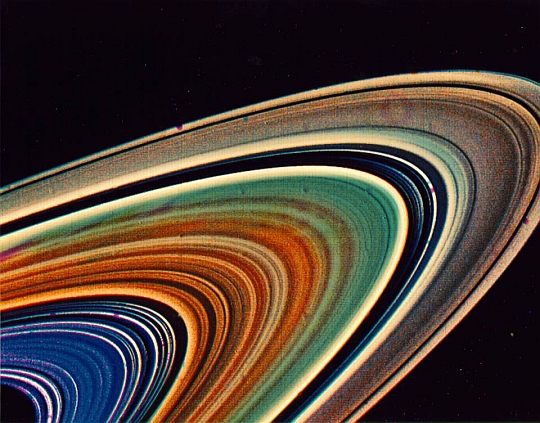
‘Sed sic, Scipio, ut avus hic tuus, ut ego, qui te genui, iustitiam cole et pietatem, quæ cum magna in parentibus et propinquis, tum in patria maxima est. Ea vita via est in cælum et in hunc cœtum eorum, qui iam vixerunt et corpore laxati illum incolunt locum, quem vides’ (erat autem is splendidissimo candore inter flammas circus elucens), ‘quem vos, ut a Graiis accepistis, orbem lacteum nuncupatis.’ Ex quo omnia mihi contemplanti præclara cetera et mirabilia videbantur. Erant autem eæ stellæ, quas numquam ex hoc loco vidimus, et eæ magnitudines omnium, quas esse numquam suspicati sumus, ex quibus erat ea minima, quæ, ultima a cælo, citima a terris, luce lucebat aliena. Stellarum autem globi terræ magnitudinem facile vincebant. Iam ipsa terra ita mihi parva visa est, ut me imperii nostri, quo quasi punctum eius attingimus, pæniteret.
Quam cum magis intuerer ‘Quæso’ inquit Africanus, ‘quousque humi defixa tua mens erit? Nonne aspicis, quæ in templa veneris? Novem tibi orbibus vel potius globis conexa sunt omnia, quorum unus est cælestis, extumus, qui reliquos omnes complectitur, summus ipse deus arcens et continens ceteros; in quo sunt infixi illi, qui volvuntur, stellarum cursus sempiterni; cui subiecti sunt septem, qui versantur retro contrario motu atque cælum; ex quibus unum globum possidet illa, quam in terris Saturniam nominant. Deinde est hominum generi prosperus et salutaris ille fulgor, qui dicitur Iovis; tum rutilus horribilisque terris, quem Martium dicitis; deinde subter mediam fere regionem sol obtinet, dux et princeps et moderator luminum reliquorum, mens mundi et temperatio, tanta magnitudine, ut cuncta sua luce lustret et compleat. Hunc ut comites consequuntur Veneris alter, alter Mercurii cursus, in infimoque orbe luna radiis solis accensa convertitur. Infra autem iam nihil est nisi mortale et caducum præter animos munere deorum hominum generi datos, supra lunam sunt æterna omnia. Nam ea, quæ est media et nona, tellus, neque movetur et infima est, et in eam feruntur omnia nutu suo pondera.’
Quæ cum intuerer stupens, ut me recepi ‘Quid? hic’ inquam ‘quis est, qui complet aures meas tantus et tam dulcis sonus?’ ‘Hic est’ inquit ‘ille, qui intervallis disiunctus imparibus, sed tamen pro rata parte ratione distinctis impulsu et motu ipsorum orbium efficitur et acuta cum gravibus temperans varios æquabiliter concentus efficit; nec enim silentio tanti motus incitari possunt, et natura fert ut extrema ex altera parte graviter, ex altera autem acute sonent. Quam ob causam summus ille cæli stellifer cursus, cuius conversio est concitatior, acuto et excitato movetur sono, gravissimo autem hic lunaris atque infimus; nam terra nona inmobilis manens una sede semper hæret complexa medium mundi locum. Illi autem octo cursus, in quibus eadem vis est duorum, septem efficiunt distinctos intervallis sonos, qui numerus rerum omnium fere nodus est; quod docti homines nervis imitati atque cantibus aperuerunt sibi reditum in hunc locum, sicut alii, qui præstantibus ingeniis in vita humana divina studia coluerunt.

“Scipio, your grandfather, like myself, your father, cherish justice and that sacred observance of duty to your kind, which, while of great worth toward parents and relations, is of supreme value for your country. Such a life is the way to heaven, and to this assembly of those who have already lived, and, released from the body, occupy the space which you now see before you,” — it was that circle that shines forth among the stars in the most dazzling white, — “which the Greeks have taught us to call the Milky Way.” And as I looked on every side I saw other things of surpassing wonder and magnificence. There were stars which could not be viewed from below, and these stars were vast, far beyond what we have ever imagined. The least of them was that which, farthest from heaven, nearest to the earth, shone with a borrowed light. But the starry spheres greatly surpassed the earth in magnitude. The earth itself indeed looked to me so puny as to make me ashamed of our great empire, which was not more than a dot upon its surface.
While I was gazing fixedly upon the earth, Africanus said: “How long, I ask, will your mind be fastened on the ground? Do you take note of the temples into which you have come? In your sight are nine orbs, or rather globes, by which all things are bound, one to another. One is the celestial, the outermost, embracing all the rest, — the Supreme God himself, who governs and keeps in their places the other spheres. In this are fixed those stars which ever roll in an unchanging course. Beneath this are seven spheres which have a retrograde movement, opposite to that of the heavens. One of these is the domain of the star which on earth they call Saturn. Next is the luminary which bears the name of Jupiter, of prosperous and healthy prospect to humankind; then, the star of fiery red which you call Mars, and which men regard with terror. Beneath this, the Sun holds nearly the midway space, leader, prince, and ruler of the other lights, the mind and regulating power of the universe, so vast as to illuminate and flood all things with his light. Him, as his companions, Venus and Mercury follow on their different courses; and in a sphere still lower the moon revolves, lighted by the rays of the sun. Beneath this there is nothing save the mortal and perishable, except the souls bestowed upon the human race, the gift of the gods. Above the moon all things are eternal. The earth, which is the central and ninth sphere, has no motion, and is the lowest of all, and all heavy bodies gravitate spontaneously toward it.”
When I had recovered from my amazement at these things I asked, “What is this sound so strong and so sweet that fills my ears?” “This,” he replied, “is the melody which, at intervals unequal, yet differing in exact proportions, is made by the impulse and motion of the spheres themselves, which, softening shriller by deeper tones, produce a diversity of regular harmonies. Nor can such vast movements be urged on in silence; and by the order of nature the shriller notes sound from one extreme of the universe, the deeper from the other. Thus there in the supreme celestial sphere with its clustered stars, as it revolves more rapidly, moves with a shrill and quick strain; this lower sphere of the moon sends forth deeper notes; while the earth, the ninth sphere, remaining motionless, always stands fixed in the lowest place, occupying the centre of the universe. But these eight revolutions, of which two, those of Mercury and Venus, are in unison, make seven distinct tones, with measured intervals between, and almost all things are arranged in sevens. Skilled men, copying this harmony with strings and voice, have opened for themselves a way back to this place, as have others who with excelling genius have cultivated divine sciences in human life. But the ears of men are deafened by being filled with this melody; nor is there in you mortals a sense less atuned than that of hearing.”
—Marcus Tullius Cicero, De re publica lib vi (44 CE) in the Loeb edition of the works of Cicero, vol. xvi, pp. 268-73 (S.H. transl. following A.P. Peabody and C.W. Keyes).
Listen to Wolfgang Amadeus Mozart’s Il Sogno di Scipione, KV 126, a “theatrical act” composed in 1771 and derived from this Cicero passage in a Philips recording by Leopold Hager and the Chamber Orchestra of the Salzburg Mozarteum.


